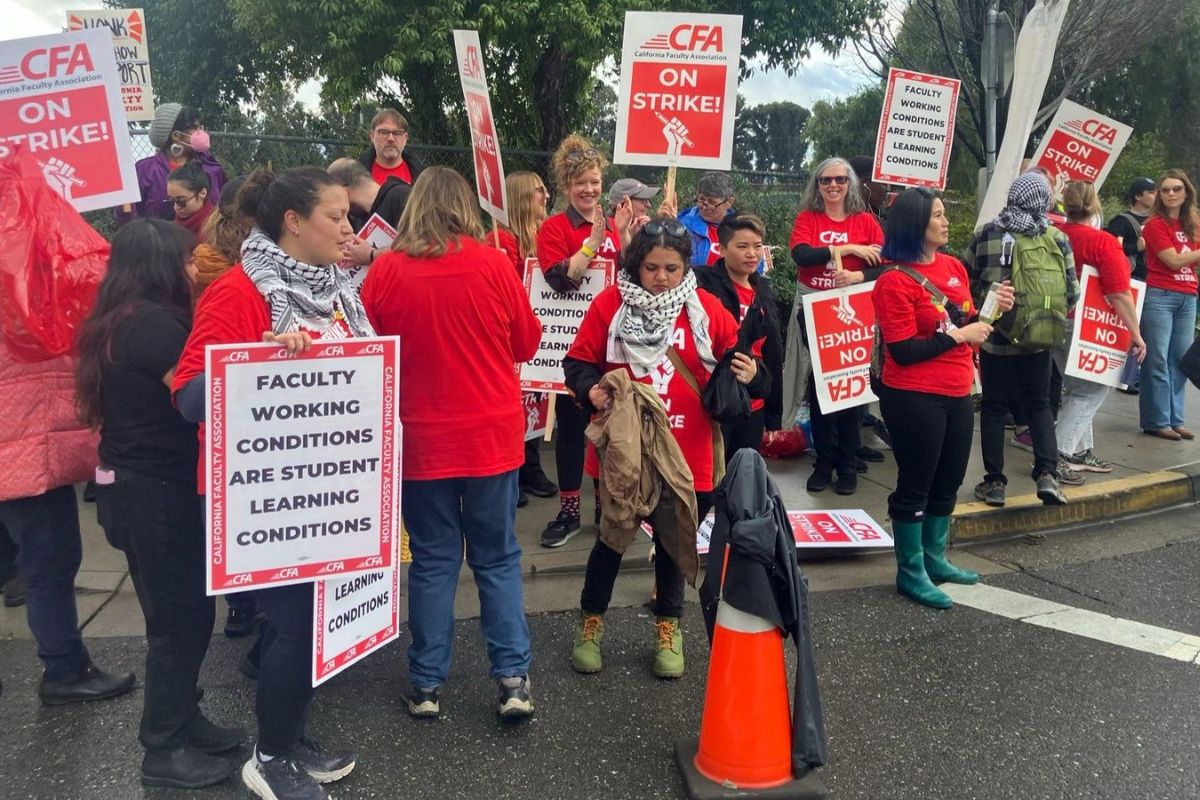Controversial Contract Vote by California: Have you ever imagined a scenario where voting ‘no’ actually translates to a ‘yes’?
The recent contract vote by the California State Faculty Union has sparked intense debate and raised concerns about the implications of such a decision.
As the controversy unfolds, questions arise regarding the integrity of the process and the potential consequences for faculty members.
Stay tuned to uncover the complexities surrounding this contentious issue and the implications it may have for the academic community.
Key Takeaways
- Faculty union’s contract vote controversy undermines democratic process.
- ‘No’ vote misinterpreted as agreement, sparking faculty outrage.
- Lack of transparency and deceptive ballot wording erodes trust.
- Faculty’s dissent disregarded, highlighting union leadership’s disconnect.
Controversial California Faculty Agreement Sparks Opposition
Amidst the fervor surrounding the California Faculty Association’s Tentative Agreement, opposition has surged due to the proposed 5 percent raises that fall short of faculty members’ 12 percent salary increase demands. The dissatisfaction stems from the perceived disparity between what was expected and what’s being offered in the agreement. Faculty members, numbering around 29,000, find themselves at a crossroads as they weigh the implications of accepting a contract that doesn’t meet their financial aspirations. The proposed 5 percent increase for the upcoming years, dependent on state funding, has triggered skepticism and disappointment among the faculty.
The discontent among the faculty highlights a broader concern regarding fair compensation and recognition for their contributions. The stark contrast between the desired 12 percent raise and the 5 percent raise outlined in the agreement has intensified the opposition. This disparity has prompted faculty members to critically evaluate the terms of the agreement and consider the impact of accepting a contract that falls significantly short of their expectations.
Concerns Over Staffing and Working Conditions Dominate TA Debate
The ongoing debate surrounding the California Faculty Association’s Tentative Agreement has now shifted focus towards the prevailing concerns over staffing levels and working conditions, a pivotal aspect dominating discussions among faculty members. Critical issues such as staffing gains, mental health counselor provisions, class sizes, and workloads haven’t been adequately addressed or are ambiguously defined within the TA framework.
Faculty members are expressing dissatisfaction with the lack of attention given to these crucial aspects, underscoring the limitations of the current agreement. The inadequate provisions related to staffing and working conditions are sparking intense debates and raising questions about the overall effectiveness of the proposed agreement.
Faculty members are voicing their concerns about the potential impact of these unresolved issues on their ability to effectively carry out their roles and responsibilities. As the discussions continue, it’s evident that addressing these concerns is essential to ensuring a fair and satisfactory agreement for all parties involved.
Sham Ballot Sparks Outrage Among Faculty
Upon discovering the sham ballot, faculty members are expressing outrage over the limited choices presented regarding the controversial contract vote. The following points illustrate the depth of their frustration:
- False Dilemma: Faculty feel trapped between two unfavorable options, undermining the principles of fair negotiation.
- Lack of Transparency: The hidden agenda behind the ballot’s wording raises suspicions about the union’s integrity.
- Diminished Voice: By equating a ‘no’ vote to acceptance, faculty’s right to dissent is effectively nullified.
- Erosion of Trust: The deceptive nature of the ballot erodes trust between the union leadership and its members, fostering a sense of betrayal.
The faculty’s anger stems from a sense of being misled and deprived of a genuine choice in a critical decision that directly impacts their working conditions and professional futures. The manipulation of the voting process has sparked a firestorm of discontent among faculty members who now question the very foundations of their union’s democratic processes.
CFA Bureaucracy Faces Criticism, Allegations of Betrayal
Critics question the CFA bureaucracy’s alignment with the CSU administration and Democratic Party, raising suspicions about their commitment to upholding faculty’s democratic rights amidst accusations of betrayal and undemocratic practices. The handling of the contract vote has sparked controversy, with many faculty members feeling betrayed by a leadership they expected to safeguard their interests.
The perceived collusion between the CFA bureaucracy and external entities has cast a shadow of doubt on the union’s intentions, prompting concerns about the erosion of democratic principles within the organization. Allegations of undemocratic practices further fuel the discontent among faculty, who are now demanding transparency and accountability from their representatives.
The perceived disconnect between the leadership and the grassroots members has widened, creating a rift that threatens the unity of the union. As accusations of betrayal reverberate within the academic community, the CFA bureaucracy faces mounting pressure to address these concerns and restore faith in their stewardship of faculty rights.
Also Read: SB 403 California Stand Against Caste Discrimination
Call for Rank-and-File Action and Broader Struggle
Amidst escalating dissatisfaction, a pivotal call has emerged to transition the focus from bureaucratic oversight to empowering rank-and-file faculty members. The Steering Group of CSU Rank-and-File Committees gains prominence in advocating for a broader struggle, urging unity among professors, teaching staff, and graduate students across all 23 campuses to combat tuition increases and advocate for adequate university resources.
Emotions Evoked:
- Unity: Encouraging solidarity among faculty members to amplify their voices and effect change.
- Empowerment: Fostering a sense of agency and influence for rank-and-file members in decision-making processes.
- Resistance: Building a collective front against tuition hikes and insufficient university support.
- Mobilization: Igniting a call to action for professors, teaching staff, and graduate students to engage in a broader struggle for better working conditions and educational quality.
Conclusion Of Controversial Contract Vote by California
You must address the alarming trend of equating ‘no’ votes to ‘yes’ in the recent controversial contract vote by the California State Faculty Union.
The concerns raised by faculty about staffing and working conditions can’t be ignored. The CFA bureaucracy’s actions have sparked outrage and allegations of betrayal within the ranks.
It’s crucial for rank-and-file members to take action and push for a broader struggle to ensure their voices are heard and their rights are protected.



